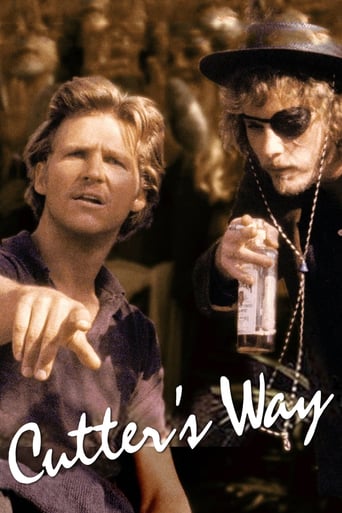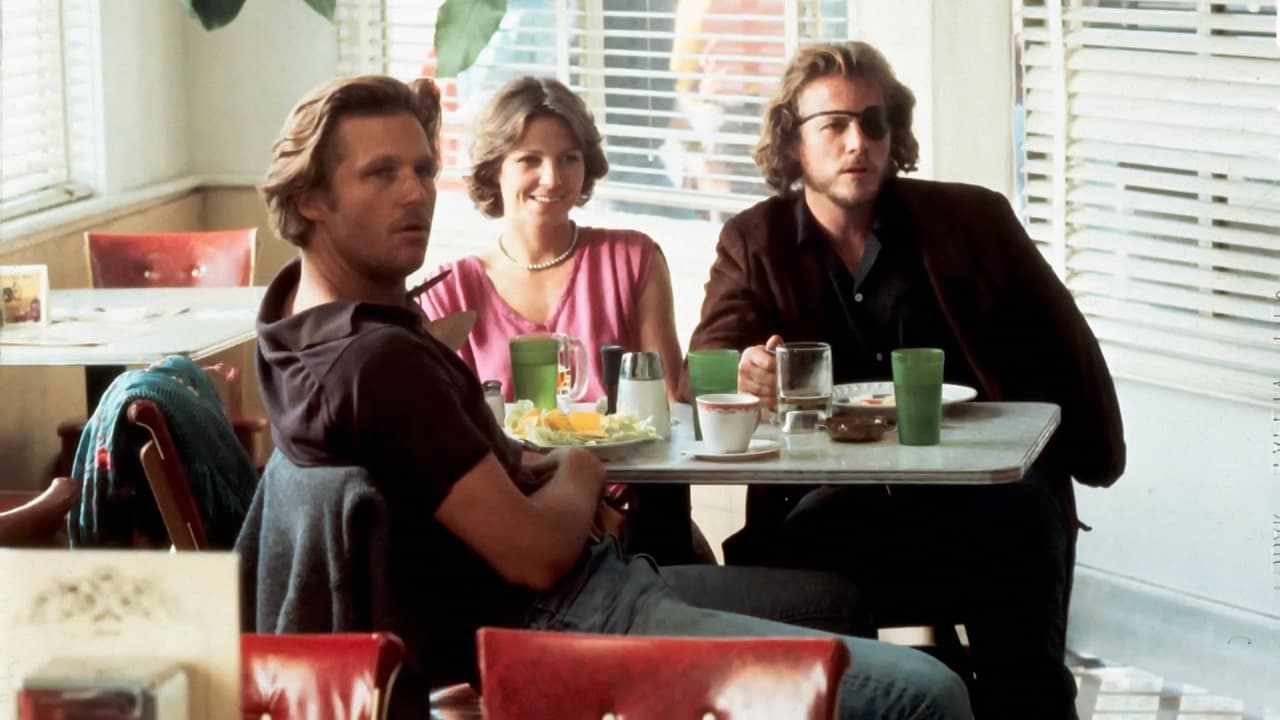Scott LeBrun
This adaptation of the Newton Thornburg novel "Cutter and Bone" stars Jeff Bridges, John Heard, and Lisa Eichhorn in its principal roles. It's a sad, cynical story of friendship and loss, in a post- Vietnam, post-Watergate America. Bridges is Richard Bone, an unambitious but likable young stud currently earning a living as a yacht salesman. Heard is his friend Alex Cutter, a bitter, confrontational, and disabled veteran. And Eichhorn is Maureen, the despairing alcoholic whom they both love. One night, when his car breaks down in an alley, Richard sees a man disposing of a body. That man just might be filthy rich J.J. Cord (Stephen Elliott), and Alex relentlessly prods Richard into doing something with this knowledge."Cutter's Way" is more of a character study than anything else, taking a blunt, unflinching look at our three flawed protagonists. Cutter bemoans the lack of "heroes" in the world, and doesn't approve of the way that Bone avoids commitments. Maureen doesn't get much love or affection from her husband Cutter, and finds herself drawn to the more easygoing Bone. All three of the leads are impressive, especially Eichhorn. But it's often Heard that steals the show; his Cutter is a force of nature much of the time, although the character is not without humanity.Czech-born director Ivan Passer gives us a film that is noticeably low key and slowly paced, so it won't appeal to all tastes. The main draw really is the acting, although it's commendable that the story isn't patently predictable. It's up to us to decide if Cord really is guilty of the crime.The offbeat music score by Jack Nitzsche (reminiscent of his music for "One Flew Over the Cuckoo's Nest" at times) and the gorgeous photography of various Santa Barbara locations are a big plus. Also among the supporting cast are Ann Dusenberry, Arthur Rosenberg, and Nina van Pallandt; look for Billy Drago in a bit as a garbageman.Fairly compelling stuff, with some truly sobering moments.Seven out of 10.
dougdoepke
Brilliant allegorical film about wealth, power, and commitment in America. Judging from other reviews, the film does not appeal to everyone. That's understandable. The characters are almost uniformly dislikable, from the abusive Rich (John Heard), to the egotistical Alex (Jeff Bridges), to the self-pitying Mo (Lisa Eichorn), to the slimy George (Arthur Rosenburg)-- there is no one left to root for. At least not until later when the two crippled halves of Bridges and Heard finally unite, figuratively and literally, into one potent whole. Then we realize that it's toward this completion that the twists and turns of the movie have been moving all along. (I think this also explains why the Ann Dusenberry character drops out at a critical stage. She is no longer needed to get the two together.)Rarely has any film dared to create such an unsympathetic cast of personalities, especially Heard's Richard Cutter. If he has a single redeeming quality, I can't find it. His loud, grating voice annoys, piling on one sarcasm after another, oblivious to the hurt he causes. Like Mo he wallows in self-pity, and even shamelessly exploits his disability. Then too, his pursuit of the god-like J. J. Cord should appear noble, yet seems more the result of paranoid rage than a desire for justice. In fact, Heard's explosion of anger on the Santa Monica pier is among the scariest, most convincing expressions of pent-up emotion that I've seen in many years of movie watching. Perhaps he can be charitably viewed as an avenging angel, in the manner of Lee Marvin in Point Blank. But that's a a stretch, since the Vietnam War has left him literally half-a-man, a berserk little top spinning around on alcohol and apoplexy, which, of course, is why he needs the able-bodied Alex to carry out his obsession.Yet Bridge's Alex Bone is an ultimate floater, getting by on boyish good-looks and charm. He has no concerns beyond himself, even seducing the vulnerable Mo, while husband Cutter is away. Apathy is his natural state. So trying to get him to act on the murder he's witnessed is like trying to push a big rock uphill. In fact, when he finally does blend with Cutter's rage and act, it's only because of Cord's arrogant 'sunglasses' gesture, and not because of a sudden steadfast commitment. In most films, it would be the handsome Bone riding the white charger and storming the heavens, having undergone a last minute conversion, and finally giving the audience someone to root for. Here, however, it's the wild spirit of Cutter who rides to the rescue, having at last gotten his legs back if only for a moment. Thus, contrary to expectations, the only concession to Bone is a compromised last minute one.There is, of course, a political subtext to all of this as one perceptive reviewer points out. Perhaps it's about how criminal wealth and power exist beyond the reach of ordinary folks, and how a commitment for change gets dispersed by escapism and a popular feeling of powerlessness, which can only be corrected by what appears a radical form of madness. But allegories aside, this is a bitter brew that does not go down easily. More than that, however, it remains a superb cult film whose provocative characters and perplexing imagery stay with you long after the screen has gone to black.
Robert J. Maxwell
Jeff Bridges is a passive, educated drifter in paradisaical Santa Barbara who half-glimpses a murderer he can't later describe to the police. Bridges avoids complications in his life. Anything resembling excitement and purpose is alien to him. He friend, John Heard, is just the opposite. He's a Vietnam vet who has lost an eye, a forearm, and a leg. He's become a raging alcoholic. His wife, Lisa Eichhorn, does her best to enable him and keep his rampages damped down enough to avoid the attention of the police. She also has an eye for the tanned and strapping Bridges, and vice versa.A week or so after the murder, which has put Bridges' photo on the front page, the trio are watching the local Spanish Fiesta parade and Bridges impulsively grabs Heard and shouts, "That's him!", meaning the murderer. The person so identified happens to be one of those impossibly rich barons of industry that you only read about or catch a photo of, with a trophy blond on his arm. Bridges explains that he's not really sure, but Heard has latched on to an adventure mystery and is determined to follow it through.Somewhere around here the plot gets a little weird. Heard hatches a plan to trap the baron. They'll hand him a letter demanding blackmail and when the baron pays up, they'll turn him over to the police. Things go wrong and Heard's wife is killed when their house burns down under mysterious circumstances.The stricken and now sober Heard incorporates the incident into his fantasies. The baron, he believes, burned the house down because he'd seen Bridge's photo in the paper and thought Bridge was in the house.There is a party at the baron's mansion when everything comes together and the murderer dies of a gunshot wound.It's pretty slow. It captures the lush atmosphere of Santa Barbara very well, though, rendering it perhaps lusher than it actually is. There are scenes that look as if they'd been shot on the Florida keys. Thank you, Josan Russo.The dialog isn't bad and has its occasional felicity. The performances are quite good too. John Heard has by far the splashiest part, hobbling around like Richard III and speaking in menacing squawks. He's got his drunken persona wrong though. All drunks do not cackle like maniacs to show they're drunk. And they can't sober up in two minutes by gargling mouthwash. It's a one-dimensional drunk. Lisa Eichhorn is wall eyed and has classical features that seem to radiate perception and understanding. And she does some nice work, sobbing with guilt while making love to Bridges.But it's not a particularly taut script. The ambiguity of Heard's paranoid fantasies is well done but there are a lot of divagations into the relationships between the three principals, and there are times when the murder mystery seems almost irrelevant to the goings on. At first I thought this was deliberate but now I'm not so sure. The climax has Heard galloping a white horse through a garden party and crashing through a window. What is this, the Marx brothers? The scene only seems to be there to provide a little much-needed action.But, at that, I must say it's refreshing to see a movie about characters like this investigating a murder, and not have to sit through another car chase or more exploding fireballs. The problem is that there wasn't really enough murder mystery to go around and the lacunae in the story seemed filled up with aimless scenes of Heard stumbling drunkenly around and smashing cars and furniture.There's a good deal of potential in the skeleton of this story. A neurotic and manic cripple, a self-satisfied surfer, and a patient wife who is slowly losing her patience. Maybe the murder should have been simply thrown out and the story built around the characters. Or the other way around.
merklekranz
"When I gotta go, I go". "On point, only place to be, Purple Heart land". "Toyota's a shitty car anyway". "What do they call you cats these days anyway"? "Cutter's Way" is perhaps the most quotable movie ever made. John Heard's Cutter is absolutely unforgettable. "The world lacks heroes" is his ultimate statement, and perfectly describes what drives the movie to greatness. Every character in "Cutter's Way" revolves around Cutter and his passionate pursuit of justice. Bone is merely swept along, in this rising tide of enthusiasm. The ending is one of the most genuine conclusions ever put on film. If you only see one DVD. See "Cutter's Way". It is a masterpiece. - MERK



 AD
AD



